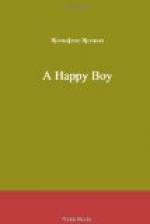“He took the sacrament to-day,” said she; “he surely thought of you.”
“No; he did not think of me,” said Anders. “I know him; he thinks only of himself.”
For a long time there was silence; the sweat poured from Baard as he stood there, although it was a cold evening. The wife inside was busied with a kettle that crackled and hissed on the hearth; a little infant cried now and then, and Anders rocked it. At last the wife spoke these few words:—
“I believe you both think of each other without being willing to admit it.”
“Let us talk of something else,” replied Anders.
After a while he got up and moved towards the door. Baard was forced to hide in the wood-shed; but to that very place Anders came to get an armful of wood. Baard stood in the corner and saw him distinctly; he had put off his threadbare Sunday clothes and wore the uniform he had brought home with him from the war, the match to Baard’s, and which he had promised his brother never to touch but to leave for an heirloom, Baard having given him a similar promise. Anders’ uniform was now patched and worn; his strong, well-built frame was encased, as it were, in a bundle of rags; and, at the same time, Baard heard the gold watch ticking in his own pocket. Anders walked to where the fagots lay; instead of stooping at once to pick them up, he paused, leaned back against the wood-pile and gazed up at the sky, which glittered brightly with stars. Then he drew a sigh and muttered,—
“Yes—yes—yes;—O Lord! O Lord!”
As long as Baard lived he heard these words. He wanted to step forward, but just then his brother coughed, and it seemed so difficult, more was not required to hold him back. Anders took up his armful of wood, and brushed past Baard, coming so close to him that the twigs struck his face, making it smart.
For fully ten minutes he stood as if riveted to the spot, and it is doubtful when he would have left, had he not, after his great emotion, been seized with a shivering fit that shook him through and through. Then he moved away; he frankly confessed to himself that he was too cowardly to go in, and so he now formed a new plan. From an ash-box which stood in the corner he had just left, he took some bits of charcoal, found a resinous pine-splint, went up to the barn, closed the door and struck a light. When he had lit the pine-splint, he held it up to find the wooden peg where Anders hung his lantern when he came early in the morning to thresh. Baard took his gold watch and hung it on the peg, blew out his light and left; and then he felt so relieved that he bounded over the snow like a young boy.
The next day he heard that the barn had burned to the ground during the night. No doubt sparks had fallen from the torch that had lit him while he was hanging up his watch.
This so overwhelmed him that he kept his room all day like a sick man, brought out his hymn-book, and sang until the people in the house thought he had gone mad. But in the evening he went out; it was bright moonlight. He walked to his brother’s place, dug in the ground where the fire had been, and found, as he had expected, a little melted lump of gold. It was the watch.




